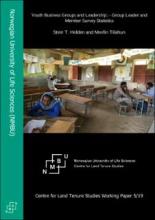Land Library
Welcome to the Land Portal Library. Explore our vast collection of open-access resources (over 74,000) including reports, journal articles, research papers, peer-reviewed publications, legal documents, videos and much more.
/ library resources
Showing items 19 through 27 of 300.This working paper is an output from the research project “Youth Business Groups for Sustainable Development: Lessons from the Ethiopian Model” that is funded by Research Council of Norway under the NORGLOBAL2 research program for the period 2019-2022.
This working paper is an output from the research project “Youth Business Groups for Sustainable Development: Lessons from the Ethiopian Model” that is funded by Research Council of Norway under the NORGLOBAL2 research program for the period 2019-2022.
This report summarizes the implementation activities, “policy intersections” and the subsequent production of a draft model Land Use Bill (LUB, 2018) for Nigeria.
Government intervention and local level coordination of large-scale investment decisions are important components required for positive impacts on food security, nutrition and livelihoods of host communities.
A new Model Land Use Bill is proposed to address the lapses identified in the Nigerian Land Use Act (LUA, 1978), such as poor administrative system for lands, ownership, and the absence of community participation.
The meetings addressed the progress of the International Land Coalition for Africa (ILC), its strategic priorities, and as well, developed ideas on how to apply lessons learned.
Adaptation at Scale in Semi-Arid Regions (ASSAR) researchers collaborated to understand the complex changes and patterns in semi-arid vegetation and socio-ecological systems.
It’s been ten years since open data first broke onto the global stage. Over the past decade, thousands of programs and projects around the world have worked to open data and use it to address a myriad of social and economic challenges.
This detailed evaluation of the Governance and Justice (GJ) Program (formerly Governance, Security and Justice - GSJ) takes stock of progress in programme delivery and reflects on potential modifications, both programmatically and institutionally, that can be brought to the GJ Program design goin









